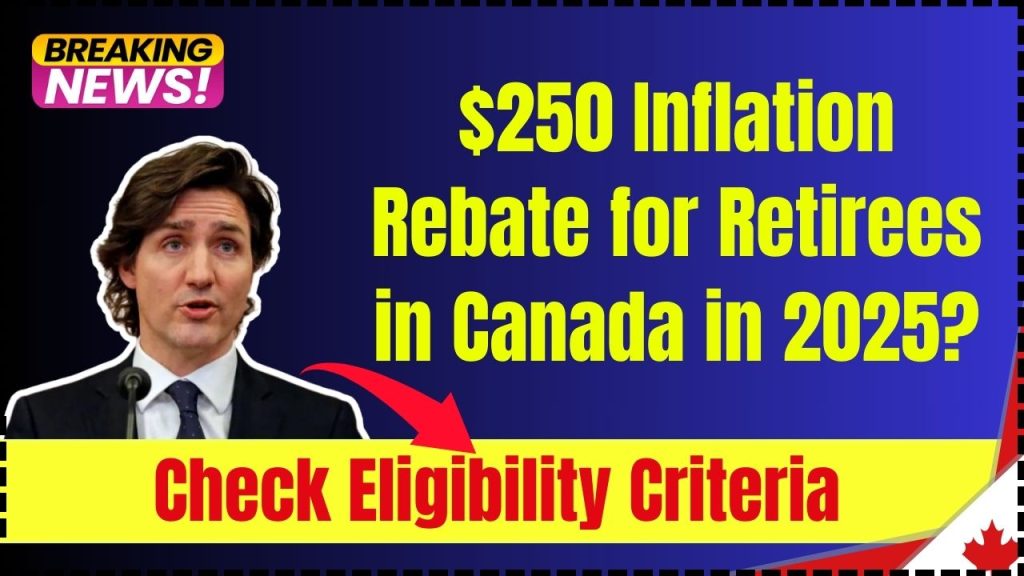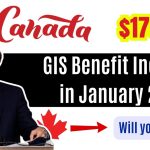
$250 Inflation Rebate for Retirees in Canada in 2025: Recent discussions about a $250 inflation rebate for Canadian retirees in 2025 have created confusion. While the Working Canadians Rebate is a confirmed initiative aimed at providing financial relief to Canadians, retirees and non-working individuals are not included in this specific rebate. Let’s clarify the details, examine the program, and explore alternative support options for seniors.
$250 Inflation Rebate for Retirees in Canada in 2025
The $250 Working Canadians Rebate provides vital support to employed individuals facing inflationary pressures, but retirees and non-working Canadians are excluded from this program. However, retirees have access to other financial assistance options, including OAS, GIS, and CPP. By staying informed about available programs and managing expenses strategically, seniors can better navigate the challenges of inflation.
| Feature | Details |
|---|---|
| Rebate Amount | $250 (tax-free) |
| Eligibility Criteria | – Worked in 2023- Individual net income up to $150,000- Filed 2023 tax return by December 31, 2024- Resident of Canada on March 31, 2025- Not incarcerated for at least 90 days before April 1, 2025- Alive on April 1, 2025 |
| Ineligibility | Retirees and non-working individuals in 2023 are not eligible |
| Distribution Method | Automatic payment via direct deposit or cheque |
| Payment Timeline | Early spring 2025 |
| Official Resource | Government of Canada Announcement |
Understanding the $250 Working Canadians Rebate
Purpose of the Rebate
The $250 Working Canadians Rebate is a one-time, tax-free payment aimed at easing the financial pressures caused by inflation. The initiative targets individuals who were employed in 2023, recognizing their contributions to the economy. Approximately 18.7 million Canadians are expected to benefit from this rebate.
Eligibility Criteria
To qualify, individuals must meet these conditions:
- Employment in 2023: Engaged in work or self-employment during the year.
- Income Threshold: Individual net income must not exceed $150,000.
- Tax Filing: Must file a 2023 income tax return by December 31, 2024.
- Residency: Resident of Canada on March 31, 2025.
- Living Status: Alive on April 1, 2025.
- Incarceration Status: Not incarcerated for at least 90 days before April 1, 2025.
Distribution Details
The rebate will be automatically distributed by the Canada Revenue Agency (CRA):
- Direct Deposit: Paid to individuals with direct deposit information on file with the CRA.
- Cheque: Mailed to those without direct deposit.
Payments are expected to be completed by early spring 2025. No application is necessary, but eligible individuals must ensure their tax and banking information is up to date.
Why Retirees and Non-Working Canadians Are Excluded From $250 Inflation Rebate?
The rebate’s focus is on working Canadians, leaving out retirees and individuals who were not part of the workforce in 2023. This has sparked criticism, particularly among seniors who face similar inflationary pressures but lack the income flexibility of employed individuals.
Government’s Justification
Prime Minister Justin Trudeau has emphasized that the rebate is part of a broader strategy to support working Canadians. The government cites other programs designed for retirees, including:
- Old Age Security (OAS): Increased by 10% for seniors aged 75 and older.
- Guaranteed Income Supplement (GIS): Provides additional support for low-income seniors.
Despite these programs, critics argue that inflation impacts all Canadians, and excluding retirees overlooks their financial struggles.
Alternative Financial Support for Retirees
While the $250 rebate is unavailable to retirees, there are other programs to help alleviate financial burdens:
1. Old Age Security (OAS)
- Who Qualifies: Canadians aged 65+ meeting residency requirements.
- Benefit Amount: Varies based on income; seniors over 75 receive a 10% increase.
- How to Apply: Automatically enrolled for most; visit Canada.ca for details.
2. Guaranteed Income Supplement (GIS)
- Who Qualifies: Low-income seniors already receiving OAS.
- Benefit Amount: Based on annual income; can significantly increase monthly payments.
- How to Apply: Application required; see Canada.ca.
3. Canada Pension Plan (CPP)
- Who Qualifies: Canadians aged 60+ who contributed to CPP during their working years.
- Benefit Amount: Calculated based on contributions and retirement age.
- How to Apply: Apply online via My Service Canada Account.
4. Provincial Programs
Many provinces offer additional benefits for seniors, such as:
- Housing subsidies
- Property tax deferrals
- Prescription drug assistance
5. One-Time Provincial Inflation Relief Payments
Some provinces, such as Alberta and Ontario, have introduced one-time payments to help residents cope with inflation. Retirees should check their provincial government’s website for updates.
What Retirees Can Do to Manage Inflation
1. Review Your Budget
- Identify areas to reduce expenses.
- Focus on essential spending, such as housing, utilities, and healthcare.
2. Leverage Senior Discounts
- Many retailers, transportation services, and entertainment providers offer discounts for seniors.
3. Maximize Tax Benefits
- Claim all eligible tax credits, such as the Age Amount Credit and the Medical Expense Tax Credit.
4. Consult a Financial Advisor
- A professional can help optimize your retirement income and suggest strategies to combat inflation.
Canada Next Extra GST Payment 2025 – Check Next Payment Date & Amount
Canada $815 To $1364 Retirement Pension Payment in January 2025: Check Eligibility & Payment Date
Canada Next GST/HST Credit Payment on 3rd January 2025 – Check Eligibility & Payment Amount
Frequently Asked Questions (FAQs)
1. Is the $250 rebate real?
Yes, the $250 Working Canadians Rebate is a confirmed initiative for 2025. However, it is only available to individuals who were employed in 2023.
2. Why are retirees excluded?
The rebate is targeted at working Canadians. Retirees are not included but may qualify for other programs like OAS, GIS, and CPP.
3. How will the rebate be paid?
Payments will be automatically distributed via direct deposit or cheque by the CRA in early spring 2025.
4. What should retirees do if they need financial help?
Retirees can explore programs such as OAS, GIS, and provincial subsidies. Consulting a financial advisor may also help maximize available resources.
5. Can retirees expect any future rebates?
While the current rebate excludes retirees, advocacy groups are urging the government to introduce targeted relief measures for seniors.






